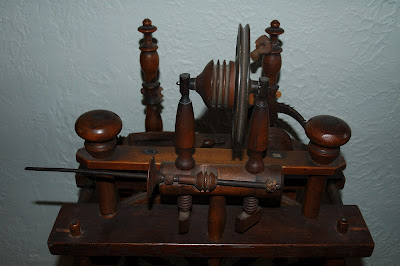
Front view: please excuse the thing hanging off the left maiden - someone wired an old leather piece to it to prevent it from getting lost - the leather piece (the shape of a guitar pick) is actually inserted in a slot in the maiden and then the end of the flyer/bobbin sits in a hole punched in the leather. You can see that the one on the left has been repaired.

The bobbin/flyer combo on the right can be set up just like the one on the left there is the corresponding hardware - it is not in position now because the leather piece is broken on that side.
Back - as you can see it has a little wheel assembly on the back.
A closer view
side 1
side 2
Accessories? The following pieces came with the wheel but do not have any obvious spot to fit into/onto it. The top two both have holes drilled through them.
One last hint - it is marked "John Sturd Evant."







4 comments:
Wow! Very cool! Unfortunately I know nothing about spinning wheels (though I wish I did and hope to at some point in the future).
I came over here from Ravelry! I'm jauncourt over there.
You have a FANTASTIC antique wheel. I am jealous. It's so COOL.
Ok, from my knowledge of wheel types, this is a "gossip" wheel (one with two functional flyers that can be used at once, either by one or two people). The spike on the back is likely a quill winder for winding thread onto paper quills to be loaded into weaving shuttles.
The three piece item is a three-segment distaff, of the type that the wool or flax is tied onto. It goes up, out, and up again, the piece without a hole is the top part, though you will have to fuss with the other two to work out which is the up and which is the out. The bottom segment should fit in a hole in the frame.
Good references, for repair and maintenance:
The Care and Feeding of Spinning Wheels (out of print, but you can find it on Amazon)
Alden Amos' Big Book of Spinning
Good luck, I hope you can get her repaired and get lots of use out of her.
I've just figured out how the quill winder might be used with the wheel (though, as somebody else said on Ravelry, it probably came from another wheel and was repurposed) - use the two lower parts of the distaff assembly, and swing the quill winder over the main wheel, connect a drive band, and go.
Not sure if it works, but if the quill head is a genuinely re-purposed part, then it should.
If it was repurposed for winding quills for weaving, then it would only be used for making long narrow tube-like quills over a paper core, so it would not have to be removable.
Not that you'll probably be using it, but parts were often recycled in this way in the 19th century.
You have a complete Minors head in beautiful shape inserted in the hole in the back. A Minors head is an accelerator for a great wheel and doesn't belong to the wheel you have there.
The extra pieces are a complete distaff assembly with markings on them - - black bands with polka dots of natural wood - - that would suggest a Connecticut origin.
The distaff belongs in the hole where the Minors head is.
Email me and I can look up the name Sturdevandt for you. hatton at pdt dot net
Post a Comment